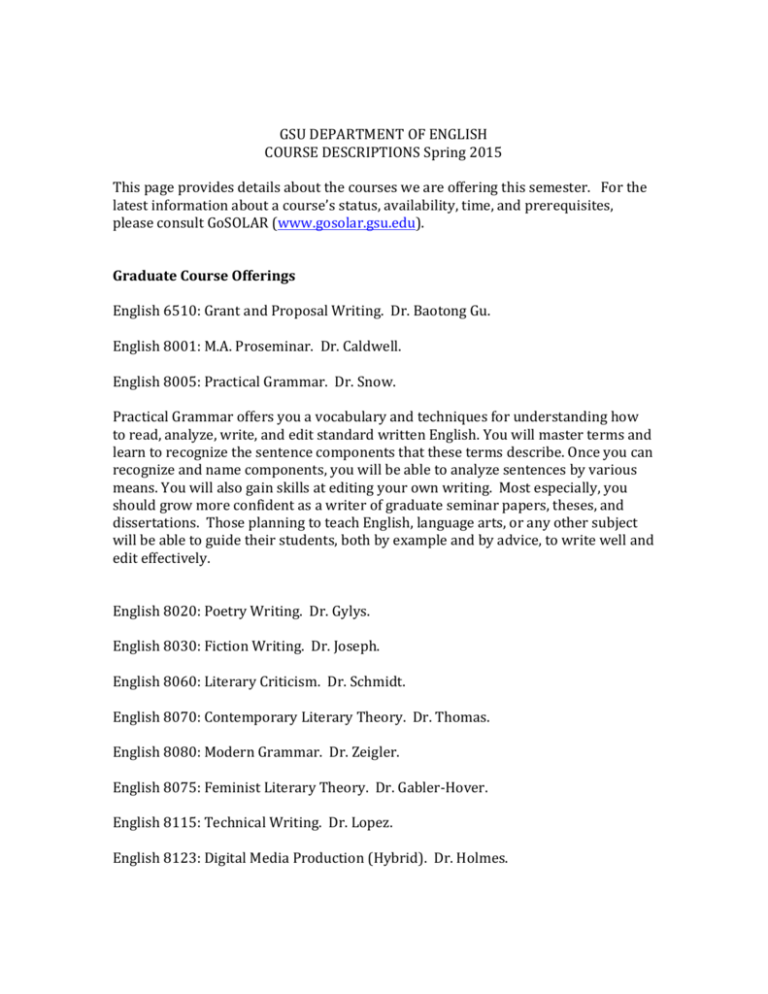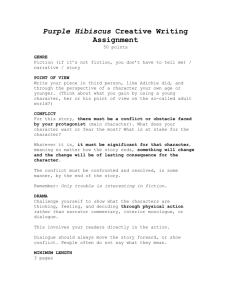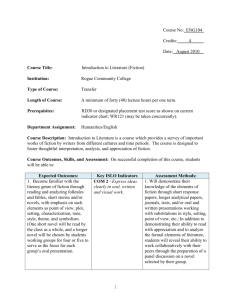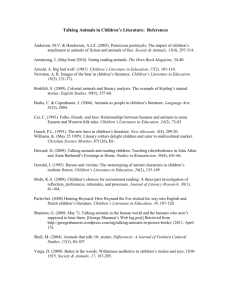GSU DEPARTMENT OF ENGLISH COURSE DESCRIPTIONS
advertisement

GSU DEPARTMENT OF ENGLISH COURSE DESCRIPTIONS Spring 2015 This page provides details about the courses we are offering this semester. For the latest information about a course’s status, availability, time, and prerequisites, please consult GoSOLAR (www.gosolar.gsu.edu). Graduate Course Offerings English 6510: Grant and Proposal Writing. Dr. Baotong Gu. English 8001: M.A. Proseminar. Dr. Caldwell. English 8005: Practical Grammar. Dr. Snow. Practical Grammar offers you a vocabulary and techniques for understanding how to read, analyze, write, and edit standard written English. You will master terms and learn to recognize the sentence components that these terms describe. Once you can recognize and name components, you will be able to analyze sentences by various means. You will also gain skills at editing your own writing. Most especially, you should grow more confident as a writer of graduate seminar papers, theses, and dissertations. Those planning to teach English, language arts, or any other subject will be able to guide their students, both by example and by advice, to write well and edit effectively. English 8020: Poetry Writing. Dr. Gylys. English 8030: Fiction Writing. Dr. Joseph. English 8060: Literary Criticism. Dr. Schmidt. English 8070: Contemporary Literary Theory. Dr. Thomas. English 8080: Modern Grammar. Dr. Zeigler. English 8075: Feminist Literary Theory. Dr. Gabler-­‐Hover. English 8115: Technical Writing. Dr. Lopez. English 8123: Digital Media Production (Hybrid). Dr. Holmes. In this production-­‐intensive course, students will learn about best practices for web design and development and will produce digital, multimodal texts to serve a variety of scholarly, pedagogical, and/or professional purposes. Potential assignments include composing a featured multimodal article for the GSU Rhetoric and Composition blog; using social media for professional development; and creating a website for one’s teaching, research, or professional profile. Offered as a hybrid course (meeting once weekly for 1 hr. 15 min.) in Spring 2015. English 8160: Form and Theory. Dr. Bottoms. English 8171: Classical Rhetoric: Roman. Dr. Burmester. English 8180: Composition Theory. Dr. Harker. An introduction to the field of Composition Studies, including bibliographical resources and competing theoretical debates; the relationships of literature, rhetoric, and literacy theory to composition studies; the application of composition theory to pedagogy; and major social, political, and curricular contexts for writing. English 8202: Contemporary Fiction Craft. Dr. Russell. English 8210: Old English. Dr. Christie. English 8230: American English. Dr. Zeigler. English 8270: Chaucer. Dr. Lightsey. English 8370: Shakespeare: Later Works. Dr. Voss. English 8450: Studies in 18th-­‐Century Fiction: Teaching Fiction. Dr. Snow. As the subtitle suggests, this course will approach eighteenth-­‐century novels with particular questions about what we can learn from them about teaching fiction. In particular, we will assume that each of these novels represents not merely itself but a style or tradition that will be seen again in novels of the following generations and that will inform us as readers and as teachers of those later novels. We will read these eighteenth-­‐century novels: Haywood, Fantomina Defoe, Moll Flanders Johnson, Rasselas Walpole, The Castle of Otranto Radcliffe, A Sicilian Romance Austen, Northanger Abbey We will also discuss nineteenth-­‐century Gothic fiction, and you will read one of the following (your choice): Shelley, Frankenstein (1818) C. Brontë, Jane Eyre (1847) E. Brontë, Wuthering Heights (1847) Stevenson, Dr. Jekyll and Mr. Hyde (1886) In addition, we will use Abbott, The Cambridge Companion to Narrative as we discuss critical principles about narrative. English 8460: 17th and 18th Century Literature in Film. Dr. Brown. We will read and discuss a number of 18th-­‐c novels in terms of their modern filmed versions; Tom Jones, Pride and Prejudice, Dangerous Liaisons will probably figure among them. We will approach these works as cultural artifacts of a kind, with the aim of discovering original meaning/intention upon publication (in as much as that is possible), how those same meanings have been reiterated (or not). Students with creative writing concentrations, screen writers, as well as students of traditional literature concentrations are all welcome. English 8510: Romanticism and Representations of Reading. Dr. Eckert. Print culture was changing drastically in the Romantic period. As one commentator forBlackwood’s Edinburgh Magazine put it, “[A] great revolution there has been, from nobody’s reading any thing, to everybody’s reading all things.” In this course we will read a variety of literary works—poems, novels, personal essays, book reviews, and letters—that represent the intense debates and exciting changes about reading culture in the Romantic period. Some of the authors we will study in this course include: Jane Austen, John Keats, Mary Shelley, Percy Shelley, Thomas De Quincey, and Lord Byron. English 8630: 19th-­‐century English Prose. Dr. Schmidt. This class will introduce the central problems (political, historical, social, literary, religious, and philosophical) of the Victorian period through the study of what many consider to be its most important literary form-­‐-­‐non-­‐fiction. In addition, students will learn to treat "factual" works like any other literary text, as subject to literary analysis and interpretation. As the Victorian period saw a flowering of autobiography, we will pay particular attention to that form, both in its theory and its practice. We will also keep an eye on the question of authority in Victorian culture. At a time when the religious foundations for authority were eroding, many Victorian intellectuals sought to find replacements for that authority as a way to provide some grounds for human moral and ethical action. Finally, as if this were not enough, through the reading of two early twentieth-­‐century texts, those by Strachey and Woolf, we will work towards an understanding of the modernist rejection of Victorian values. English 8850: Southern Literature’s Representations and Silencings. Dr. McHaney. We will approach the study of Southern Literature’s representations and silencings both widely and deeply. To survey the field, we’ll read selections from The Oxford Book of the American South: Testimony, Memory, and Fiction, the subtitle of which calls into question the blurring of factual recording and imaginative writing. To delve deeply into the ways in which Southern Literature represents and/or silences, we’ll read the following: Morrison—A Mercy, Faulkner—The Hamlet, Walker— Meridian, Douglas—Can’t Quit You, Baby, Ward—Salvage the Bones, Hall—The Mountaintop ( a play), and Trethewey—Thrall: Poems. Each student will also read one of the following autobiographies: Hurston—Dust Tracks on the Road, Smith— Killers of the Dream, Moody—Coming of Age in Mississippi, or Ray—Ecology of a Crack Childhood. We’ll familiarize ourselves with southern art and music asking again who and what we do or do not see and hear. Students may choose for their final projects an annotated bibliography, an archival research report, or a seminar paper. English 8855: Early American Literature and Culture. Dr. Smolinski. English 8870: Contemporary American Fiction, 1945-­‐Present. Dr. Kocela. This course is a survey of post-­‐1980 American fiction organized loosely around the postmodern and (“post-­‐postmodern”) representation of history and memory. For our purposes, “history” will be taken to refer to specific events and figures (the assassination of John F. Kennedy, the My Lai massacre) and to broader historical issues and legacies (the relocation of Native American peoples, the Iran-­‐Contra affair) addressed in American fiction of the period. Within this framework, the aim of the course is to encourage thinking about issues such as the nature of the fact/fiction divide, the political implications of revis(it)ing history, the role of historical consciousness in the perpetuation or interrogation of traditionally American ideals, and the reputed disappearance of (and nostalgia for) national boundaries in postmodernism. We might also examine how historical consciousness influences and is influenced by the formal features of our selected novels, characterized in terms of magic realism, historiographic metafiction, “alternate history,” and the blurring of boundaries between fiction and life writing. Authors to be studied will include: Chabon, DeLillo, Didion, Erdrich, Kingston, O’Brien, and Roth. English 8900: South Asian Literature. Dr. Rajiva. What makes South Asian literature unique? While the term adequately describes the geography of the Indian subcontinent, it also suggests a homogeneity that we will challenge by examining the complexity, plurality, and aesthetic depth of this body of literature. Our conversation will begin with Twilight in Delhi (1940), Ahmed Ali’s nostalgic account of India’s transition from Mughal control to British rule. As we move into the independence era, we’ll examine the representation of collective violence in South Asia, devoting substantial time to Partition — the 1947 creation of India and Pakistan as sovereign states that resulted in the death or displacement of hundreds of thousands of people. Finally, we’ll discuss how contemporary South Asian authors are responding to the cultural and literary legacies of British colonialism, paying attention to both the aesthetics and the ethics of representation. Authors studied will include Anita Desai, Michael Ondaatje, Arundhati Roy, and Bharati Mukherjee. English 8900: Borderlands Literature of the U.S. Southwest. Dr. Goodman What does it mean to live and write in the borderlands? This course will consider various answers to that question through exploring the history, fiction, and poetry of the U.S.-­‐Mexico border. Authors studied will include Tohono O’odham poet Ofelia Zepeda; Pueblo writer Leslie Marmon Silko; ethnobotanist Gary Paul Nabhan; Mexican-­‐American folklorist Américo Paredes; Chicana novelist Sandra Cisneros; and Anglo-­‐American novelist Cormac McCarthy. English 8900: Sonic Rhetorics and Literacies. This graduate seminar is a hybrid course that meets once a week and requires additional online instruction. Dr. Hocks “Sounds are like ghosts. They slink around the visual object, moving in on it from all directions, forming its contours and content in a formless breeze.” Salomé Voegelin, Listening to Noise and Silence: A Philosophy *Experience sound -­‐ based artwork, soundscapes, musical compositions, performances, noise and silence. *Engage with contemporary multimodal and networked genres that feature sound and develop a vocabulary for digital sonic literacies. *Learn compositional practices for teaching with sound reproduction technologies. *Critically analyze foundational and recent research on sound studies and the sonic through rhetorical studies and digital media production.







